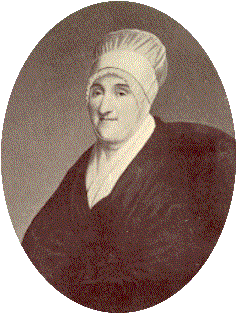|
 |

Part of the American
History & Genealogy Project |
Sallie Wister 1761 ~1804


Sallie Wister
On the twenty-fifth day of September,
1777, just two weeks after the battle of the Brandywine, the
British Army entered Germantown. On the same day, but a few
miles distant from the place, Sallie Wister, a bright and
charming Quaker girl, sixteen years of age, began to keep a sort
of journal of her observations and experiences. It was evidently
written with the object of keeping her dearest friend, young
Deborah Norris, informed of the exciting happenings of this
period. But strangely it never reached the hands for which it
was intended until years after the death of the writer. It was
published as one of the most interesting and valuable records
that has come down to us. Its clever descriptions of persons and
events, its naive confessions of likes and dislikes, it
roguishness and genial good humor and withal its dramatic
spirit, make it an extremely illuminating human document.
Instances are here depicted which are
nowhere supplied by the published records. And this diary of a
bright Quaker girl is a historical picture of social conditions
in the midst of the most important scenes of the Revolutionary
times. In the nine months covered by this account occurred the
British capture of Philadelphia, the battle of Germantown, the
surrender of Burgoyne, the skirmishes before Washington's
entrenchments of White Marsh and the acknowledgment of American
Independence by France. All these with many sidelights pass in
review before us, over the pages of Sallie Wister's diary. At
length when the British had really decamped, and Philadelphia
was once more open to its rightful citizens, she exclaims, "The
Red Coats have gone, the Red Coats have gone, and may they
never, never, never return!"
With this happy cry Sallie's diary closes and our little Quaker,
with her humors and follies, vanishes from our sight. Little is
known of Sallie Wister's later days.
History only tells us that she grew to
womanhood, that she became "quite serious" and that she "died
unmarried, April 21, 1804." We are left to wonder about the
rest. Why did Sallie Wister grow serious and why did she never
marry? All sorts of romantic reasons suggest themselves, for the
Sallie Wister of her diary was the very girl to have "an
interesting story." But we can get no further than surmise, and
it is better, perhaps, not to puzzle with what came after, but
to think of her always as the light-hearted mischievous Sallie
Wister, who though only a little Quaker made a valuable
contribution to American history through her diary.
Women of
America

Source: The Part Taken by Women in
American History, By Mrs. John A. Logan, Published by The Perry-Nalle
Publishing Company, Wilmington, Delaware, 1912.
|